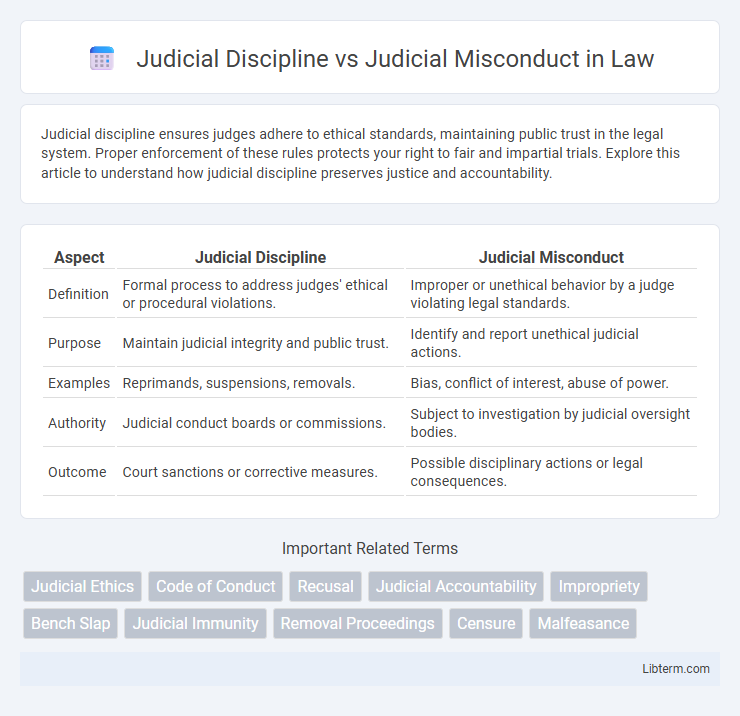Judicial discipline ensures judges adhere to ethical standards, maintaining public trust in the legal system. Proper enforcement of these rules protects your right to fair and impartial trials. Explore this article to understand how judicial discipline preserves justice and accountability.
Table of Comparison
| Aspect | Judicial Discipline | Judicial Misconduct |
|---|---|---|
| Definition | Formal process to address judges' ethical or procedural violations. | Improper or unethical behavior by a judge violating legal standards. |
| Purpose | Maintain judicial integrity and public trust. | Identify and report unethical judicial actions. |
| Examples | Reprimands, suspensions, removals. | Bias, conflict of interest, abuse of power. |
| Authority | Judicial conduct boards or commissions. | Subject to investigation by judicial oversight bodies. |
| Outcome | Court sanctions or corrective measures. | Possible disciplinary actions or legal consequences. |
Understanding Judicial Discipline: An Overview
Judicial discipline involves formal mechanisms to address breaches of judicial ethics, ensuring judges uphold integrity, impartiality, and professionalism. Judicial misconduct refers to specific unethical behaviors such as bias, corruption, or abuse of authority that trigger these disciplinary actions. Understanding judicial discipline highlights its role in maintaining public trust and the proper functioning of the judiciary by enforcing accountability measures like censure, suspension, or removal.
Defining Judicial Misconduct: Key Concepts
Judicial misconduct involves actions by judges that violate established ethical standards, including bias, corruption, or abuse of power, undermining public trust in the judiciary. Key concepts defining judicial misconduct encompass violations of judicial codes of conduct, conflicts of interest, and failure to perform duties impartially. Understanding these elements is essential for distinguishing judicial discipline processes aimed at correcting or sanctioning improper behavior.
The Importance of Upholding Judicial Standards
Upholding judicial standards is crucial to maintaining public trust and ensuring the fair administration of justice. Judicial discipline addresses violations of ethical codes and procedural rules, while judicial misconduct encompasses actions that compromise a judge's integrity or impartiality. Strict enforcement of these standards preserves judicial independence and safeguards the legitimacy of the legal system.
Common Types of Judicial Misconduct
Common types of judicial misconduct include bias or prejudice that compromises impartiality, abuse of power such as improper influence over court proceedings, and failure to follow legal procedures or ethical standards. Other frequent issues are conflicts of interest, accepting bribes or gifts, and inappropriate behavior both inside and outside the courtroom. Judicial discipline mechanisms address these violations to maintain the integrity and fairness of the judiciary.
Procedures for Addressing Judicial Discipline
Procedures for addressing judicial discipline involve formal investigations initiated by judicial conduct commissions or oversight bodies to evaluate complaints of misconduct or ethical violations. These procedures typically include confidential inquiries, hearings, and opportunities for the judge to respond before recommendations for sanctions, such as reprimands, suspension, or removal, are made to relevant judicial authorities or legislative bodies. The emphasis on due process and transparency aims to uphold judicial integrity while protecting judicial independence through clearly defined disciplinary frameworks.
Role of Judicial Oversight Bodies
Judicial oversight bodies play a critical role in maintaining the integrity of the judiciary by distinguishing judicial discipline from judicial misconduct through thorough investigations and enforcement of ethical standards. They ensure that disciplinary actions are proportionate to violations, handling minor breaches through corrective measures while addressing grave misconduct with sanctions such as suspension or removal. Effective oversight enhances public trust by promoting accountability and transparency within the judicial system.
Consequences of Judicial Misconduct
Judicial misconduct leads to severe consequences such as disciplinary action, suspension, removal from office, or even criminal prosecution depending on the severity of the offense. Judicial discipline processes are designed to uphold the integrity of the judiciary by addressing unethical behavior, including bias, corruption, or abuse of power. Effective enforcement of judicial discipline maintains public trust and ensures accountability within the judicial system.
Differences Between Discipline and Misconduct
Judicial discipline refers to the formal process and measures taken to address minor violations or ethical lapses by judges, aiming to correct behavior and maintain judicial integrity. Judicial misconduct encompasses more serious breaches of conduct, such as corruption, bias, or criminal activity, which undermine the administration of justice and erode public trust. The key difference lies in the severity and nature of the actions--discipline targets corrective actions for lesser offenses, whereas misconduct involves punishable violations that may lead to removal from office or legal consequences.
Preventative Measures for Judicial Integrity
Judicial discipline involves structured procedures to address breaches of judicial conduct, focusing on upholding ethical standards and maintaining public trust in the legal system. Preventative measures for judicial integrity include comprehensive ethics training, transparent grievance processes, and regular performance evaluations to identify and address potential misconduct early. Enhanced accountability mechanisms, such as independent judicial review boards, play a critical role in deterring judicial misconduct and reinforcing the principles of impartiality and fairness.
Promoting Public Trust in the Judiciary
Judicial discipline refers to the methods and processes used to ensure judges adhere to ethical standards and judicial codes of conduct, while judicial misconduct involves actions that violate these standards, such as bias, corruption, or abuse of power. Effective judicial discipline mechanisms promote public trust by maintaining accountability, transparency, and integrity within the judiciary. Upholding these principles ensures that courts remain fair, impartial, and respected institutions in society.
Judicial Discipline Infographic

 libterm.com
libterm.com